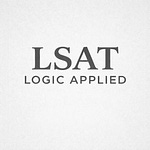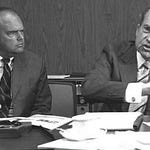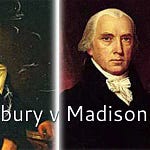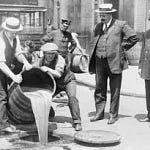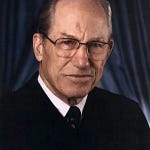In the shortest news hit we’ve ever provided, the Fox Dominion trial is back on. There has been no confirmation as to what the 24 hour delay was for. All the news stories you’re reading today that try to say more are just speculating. The end.
Dominion's defamation case against Fox poised for trial after delay | Reuters
The U.S. Supreme Court is set to hear an appeal by former mail carrier Gerald Groff, who claims that the U.S. Postal Service discriminated against him on religious grounds. Groff, an evangelical Christian, was disciplined for refusing to work on Sundays, when he observes the Sabbath. Lower courts dismissed Groff's lawsuit, arguing that exempting him from Sunday work would place too much hardship on his co-workers and employer. Groff's case centers on Title VII of the Civil Rights Act of 1964, which prohibits employment discrimination based on religion, among other factors. His attorneys are asking the Supreme Court to require companies to show "significant difficulty or expense" before denying a religious accommodation. The case has sparked debate over whether religious people are more deserving than others of weekend days off from work. Unions representing postal workers have urged the justices to consider the hardship that religious accommodations have on co-workers. The case is being closely watched as the Supreme Court, with its 6-3 conservative majority, has a track record of expanding religious rights.
US Supreme Court tackles religious bias claim against Postal Service | Reuters
U.S. News & World Report has delayed the release of its annual law school rankings by a week amid claims that the employment data they used is flawed. The publication gave an early copy of the rankings to schools on April 11th, as is customary, and some of them say they have already identified discrepancies with the data. The rankings are now scheduled to be published on April 25th. This year, U.S. News & World Report said it would give full weight to law graduates in school-funded fellowships and those in graduate program, a change from how employment was previously reported. The ostensible reason those outcomes were not reported as employment on par with a firm or in-house was the degree to which a school could “hire” its own graduates to bolster its numbers.
Law schools say US News rankings include faulty job data, as release delayed | Reuters
Johnson & Johnson's subsidiary is seeking to pause more than 38,000 lawsuits alleging that its talc products cause cancer, as it takes another attempt at resolving the litigation in bankruptcy. At a hearing in Trenton, New Jersey, LTL Management will argue that the "automatic stay" under bankruptcy law should also protect J&J, which has a market value of over $430 billion and has not filed for bankruptcy itself. Two groups of cancer plaintiffs and the US Department of Justice's bankruptcy watchdog have opposed the company's bid for a stay, arguing that it is a fraudulent attempt to evade the earlier court ruling. Before the talc lawsuits could resume, LTL filed for bankruptcy a second time, re-opening the legal battle over the bankruptcy's legitimacy. J&J has offered $8.9 billion to settle the claims, but has not provided details about how much each claimant would receive from the deal. Some plaintiffs groups have backed the company's new bankruptcy, and J&J says that attorneys who represent 60,000 plaintiffs have agreed to support the current settlement offer. U.S. Bankruptcy Judge Michael Kaplan will now decide whether to stop the lawsuits again to give LTL a second shot at a bankruptcy settlement.
J&J talc unit again seeks to halt 38,000 cancer lawsuits | Reuters
Apple's tax agreement with its hometown of Cupertino, California, has come under scrutiny by state regulators, who likely believe that the agreement is a form of taxpayer-fleecing collusion — and they’d be right. The issue concerns an agreement in which Apple assigns online purchases in California as if they were made within the city limits of Cupertino. This allows Cupertino to benefit from the 1% allocation of the 9.125% sales tax rate for purchases made within the city. Since 1998, Cupertino has handed 35% of that local portion, amounting to $107.7 million, to Apple, which in no doubt is partly prompting California to launch an audit. The state is examining the extent to which the California purchases attributed to Cupertino are legitimately tied to Cupertino. The permissibility of arrangements like these could give rise to bidding wars between municipalities, each vying to offer the most generous kickbacks in exchange for a corporation allocating its state sales to that location, benefiting only the corporation with the deepest pockets. Sales tax is, as it is, regressive and places a larger burden on low-income taxpayers. These agreements preserve that regressivity at the individual level and inject an additional element of regressiveness at the corporate level. Such arrangements distort the distribution of revenue among communities, taking hundreds of millions of already-collected dollars out of potential budgets for projects and putting them directly in the pockets of big corporations. Thus, the California Department of Tax and Fee Administration is right to launch an audit into this particular arrangement as it is pulling already-collected and remitted sales tax, paid by consumers, out of the coffers of the state and local government and putting it directly in the hands of Apple. Big problem.
Apple’s Agreement With Cupertino Is Taxpayer-Fleecing Collusion






